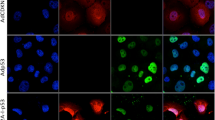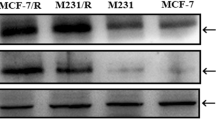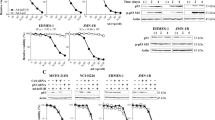Abstract
The aim of the present study is to identify the optimal anticancer agents for use in combination with gene therapy using wild-type (wt) p53 gene transfer. We used adenoviral vectors expressing human wt p53 (AdCAp53) and investigated the effects of wt p53 gene transfer in combination with 12 anticancer agents on a human pulmonary squamous cell carcinoma cell line, NCI-H157, and a human pulmonary large cell carcinoma cell line, NCI-H1299. Solutions containing anticancer agents at various concentrations were added followed by the addition of recombinant adenovirus solutions; after a 5-day incubation period, the anticancer activity was then evaluated by a 2,3-bis(2-methoxy-4-nitro-5-sulfophenyl)-2H-tetrazolium-5-carboxanilide assay. Each 50% inhibitory concentration was calculated based on the dose-response curves. The agents showing a high degree of effectiveness on NCI-H157 cells were cisplatin (CDDP), 5-fluorouracil (5-FU), bleomycin, and 7-ethyl-10-hydroxy-camptothecin (SN-38), an active metabolite of irinotecan (CPT-11); conversely, cyclophosphamide and paclitaxel showed a low degree of effectiveness. Based on these data, an isobologram was performed to investigate the interaction between AdCAp53 and some anticancer agents. A supra-additive effect was thus observed for 5-FU and SN-38 on NCI-H157 cells. An additive effect was also observed for CDDP, paclitaxel, bleomycin, and cyclophosphamide on NCI-H157 cells. CDDP, paclitaxel, 5-FU, and SN-38 had an additive effect on NCI-H1299 cells. No drug showed any subadditive or protective effects. These findings suggest that CPT-11 and 5-FU may thus be useful as possible anticancer agents for use in a combination therapy regimen using wt p53 gene transfer. CDDP and CPT-11 had a significant antitumoral effect on H157 cell xenografts of nude mice in vivo. These results indicate that CPT-11 as well as CDDP would be a candidate for the combination of chemotherapy and gene therapy for non-small cell lung cancer.
This is a preview of subscription content, access via your institution
Access options
Subscribe to this journal
Receive 12 print issues and online access
$259.00 per year
only $21.58 per issue
Buy this article
- Purchase on Springer Link
- Instant access to full article PDF
Prices may be subject to local taxes which are calculated during checkout
Similar content being viewed by others
Author information
Authors and Affiliations
Rights and permissions
About this article
Cite this article
Osaki, Si., Nakanishi, Y., Takayama, K. et al. Alteration of drug chemosensitivity caused by the adenovirus-mediated transfer of the wild-type p53 gene in human lung cancer cells. Cancer Gene Ther 7, 300–307 (2000). https://doi.org/10.1038/sj.cgt.7700096
Received:
Accepted:
Published:
Issue Date:
DOI: https://doi.org/10.1038/sj.cgt.7700096



